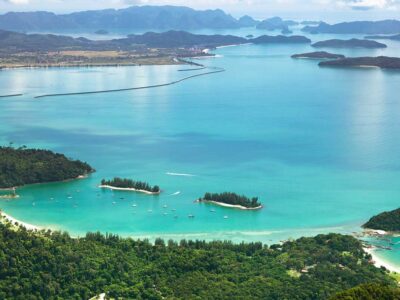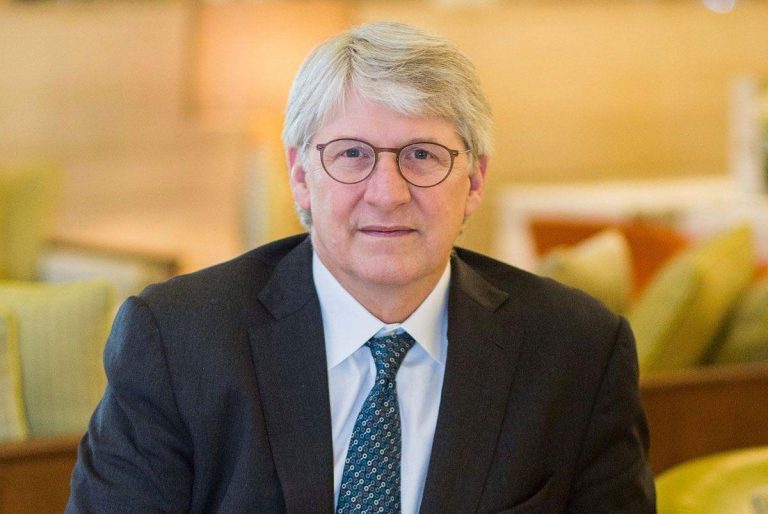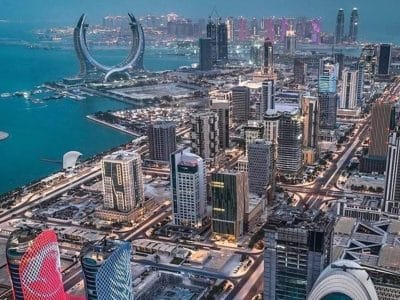When it comes to talking about Dubai and the GCC, frustration should be etched over Robert Warman’s face, but it’s not.
As CEO of Langham Hotels, he has faced more delays than most in trying to establish a presence for the hotel operator in the Gulf.
But that may all change sooner than anyone expected.
The hotel operator’s most recent announcement, in December, suggests Langham’s first property in the region may finally open. The Langham Jeddah, in the downtown district of the city, will have 238 rooms and 41 suites.
“It’s a building that’s under construction already. We anticipate the end of 2017, early 2018,” Warman says.
“It was a project that we already started. We’ve worked with the owner, made a few changes that were necessary to maintain and keep the Langham brand intact, which probably added a few months on to it.”
He says it is a “stunning location”, beside the convention centre and the new sports complex, and is close to the new Hajj terminal and the planned rail link to Medinah-Makkah.
“Many wealthy Muslims will travel to Jeddah on Hajj and we think we’ll be in a unique position to offer a luxury product to that customer who is taking the train in and out of Medinah-Makkah.”
Langham Hotels International, a wholly owned subsidiary of the $3bn, Hong Kong-listed Great Eagle Holdings, has a portfolio of 21 hotels spread across almost every region in the world, except the Middle East.

The Langham, London was the largest hotel in the city when it was built in the 1860s.
Langham Hotels has plans to open properties in the UAE, but so far Warman’s attempts have been frustrated, like many of his predecessors, with false starts and delay.
Langham’s first effort to enter the Gulf came in 2008, when then senior vice-president of development, Helmut Knipp, announced plans to open two hotels in Doha – long before any World Cup was announced. They never materialised.
Two years later, the company announced plans for a city centre hotel in the Qatari capital at Al Shemoukh Towers, which was due to open in 2012. That also failed to happen.
In 2012, the then vice president of development, Andrew Jessop, said the company still had plans to operate a property in the region, but refused to mention specifics.
In 2014, Langham insisted it would finally open its first hotel in the GCC, this time in Dubai. The initial planned date for the 323-room resort on the crescent of Palm Jumeirah was 2015. Two years later, the wait goes on, but Warman remains optimistic.
“Unfortunately the developer has struggled with their contractor in putting that together,” Warman says.
“Some projects seem to happen right away, and some projects seem to take a long time.”
The Palm Jumeirah hotel, which he says is advanced in terms of structure, is now due to open next year. “My guess is [within the] next year and a half. I would think somewhere mid-2018.”
Unperturbed, Warman says the delay will have no ill effect on the success of the hotel, which is starting to take shape and should dominate the skyline on the west crescent of the man-made structure.

The Langham, Melbourne is located on the Yarra River in the city’s heartland.
“We’re confident we’ll get through this process. We think we have a great design. It’s a little bit different, a little more contemporary, but we think that gives us a unique positioning on the Palm Jumeirah, where most of the resorts are a little more traditional. This is going to be a little more Miami Beach.”
Langham Hotels also announced in 2015 plans to open a project in Business Bay with real estate developer Omniyat. The $273m Langham Place Downtown Dubai includes a five-star, luxury hotel and serviced apartments, with a total of 438 units.
Similarly, Langham has faced delays there, too. Slated to open in 2018, the project is expected to start construction by summertime this year, Warman says, with an anticipated three-year construction timeframe. It is a project, however, that has grown in stature since it was first announced. Not only is it located on the banks of the newly opened Dubai Canal, it will also overlook a marina.
“It’s a fairly significant building on a piece of land that’s right on the canal. With the announcement of putting the marina there, it raises the impact of that spot,” Warman says. “We’re raising the lobby level so we get the maximum impact when hotel guests are there.
“As you know, in Dubai, things are constantly evolving, generally always for the positive. I think in a way we were fortunate because with the adding of [the canal], it has created a unique visual aspect of the hotel. The entire extension of the creek is going to make it a unique resort experience as well.
“The marina is going to add additional nightlife and additional restaurants and activities. It will bring more locals in that market segment,” he says.
Langham plans to also eventually make its debut in Qatar in the newly planned city of Lusail, 23km north of Doha. The luxury hotel will comprise 238 rooms, 90 luxury serviced residences and 56 residences within the master development’s new marina waterfront.
“It’s under construction. We anticipate an end of 2018, early 2019 opening,” Warman says. “It’s a very contemporary structure.”

The Langham, Jeddah will be managed by Advanced Hotels Company and is due to open next year.
Growth in the Middle East, he says, will primarily focus on the GCC.
“Three years ago we made a decision to move forward, and we thought strategically that the Middle East was a very important market to get into.
“We’re looking at another resort, possibly in Doha. We think it’s very close and that we have a unique opportunity to run a female-only resort with the largest spa in the world. We think that could be a really unique positioning to bring a high level of service into what has traditionally probably not been the top tier segment,” he says.
“We’re looking at a project in Abu Dhabi; we’re looking at Oman. We think we’ll continue to expand, certainly as the Dubai, Doha and Jeddah [projects] come out of the ground, and bring more awareness. Today, it’s hard, we know there’s going to be a Langham in Dubai, but it’s not out of the ground yet.”
Warman also reveals that Cordis, its second upscale brand, will feature in upcoming expansion plans, but not before it has established itself in Asia. With 10 other properties under development (eight are in mainland China, another in Bali and one in Auckland), the Middle East is on its radar for the next stage of growth.
“We created our second brand, Cordis, where we took an existing hotel that we were operating in Hong Kong – in Mong Kok – completely renovated it, and re-opened it in August,” he says.
“Our focus is to create Cordis, at first, as a regional brand that’s recognised by the Chinese traveller, and then begin to start looking at feeder markets going outside that area.
“We haven’t put a lot of effort [into other markets with Cordis]. We thought what was critical for our company was to really build a base of what Cordis stood for.
“[Soon] we’ll spend more time trying to expand the brand.”

Warman says The Langham, Palm Jumeirah is expected to the company’s first resort.
Other non-GCC countries within the Middle East also hold appeal for Warman. Langham’s relatively small size means he is not planning to enter into Iran, but Warman says it would be part of any natural progression as the company’s regional base grows.
“Our hope would be, as we get closer to the properties that we have signed up in the Middle East, it will afford us to have more people on the ground that are capable of expanding our reach, but also people from that market will begin to know who Langham is and obviously approach us as well,” he says.
“[That’s] in the long run. Today, not because of lack of desire, it’s just lack of resources to make sure we get into the right places, and places that will give us the most exposure in the short run for our future growth.”
Despite lagging figures in average daily rates in hotels in the region – Dubai and Abu Dhabi are both down 9.9 percent, Riyadh is down 9.1 percent – Warman remains “bullish” about the hotel market in the GCC.
“I think the market will continue to grow. I think particularly Dubai is uniquely positioned when you think about [the fact that] it’s eight hours from some parts of mainland China; hours to India, Pakistan.
“Dubai is going to continue to be the hub and that will certainly spill over to the other major cities of Doha, Abu Dhabi, Jeddah, Riyadh. The next wave you’ll see is more going on in Oman.
“Based on its location, it’s sitting in one of the most densely populated places on earth; I think not only from a recreational perspective but also a business perspective, we think the growth in this market will be positive.”
He says while figures may have been in decline in recent years, he expects an upturn in the next two years, based on other markets.

First announced in 2010, Langham Palace is expected to open in the first phase of Lusail City, Doha.
“Will you continue to see ups and downs? I can take you to New York City and see the same ups and downs in occupancy and average rates. There can be a little less pressure and a little more over-builds, but that changes.
“I think far too often people react in our industry to short-term. A lot of factors go into that; we’re bullish on the luxury market because if you look at the history, I don’t know, quite frankly, of any location where in the end the luxury market didn’t go up.
“Will we have trouble? Yes. Where that trouble is going to come from, I can’t predict.
“We’re bullish on the industry, particularly the upscale market. We generally, as a company, stay in the segments where service is an important factor in the people’s decision to buy.
“We feel good about our expansion rate, although slower than some of our competitors. I think once our company made a decision that we thought made sense – to grow and expand our business – we’ve seen incredible reception of the Langham brand.
“We’re confident we have the ability and understand how to run a luxury hotel. Unfortunately, from the decision to open a hotel, there’s a lag time. We feel very confident about our growth.”
Time will tell, but given Langham’s more recent progress it appears set to book its place in GCC hospitality.







